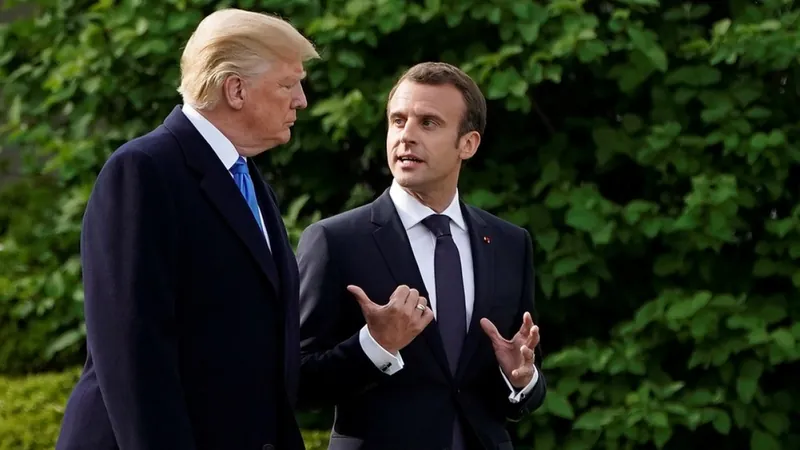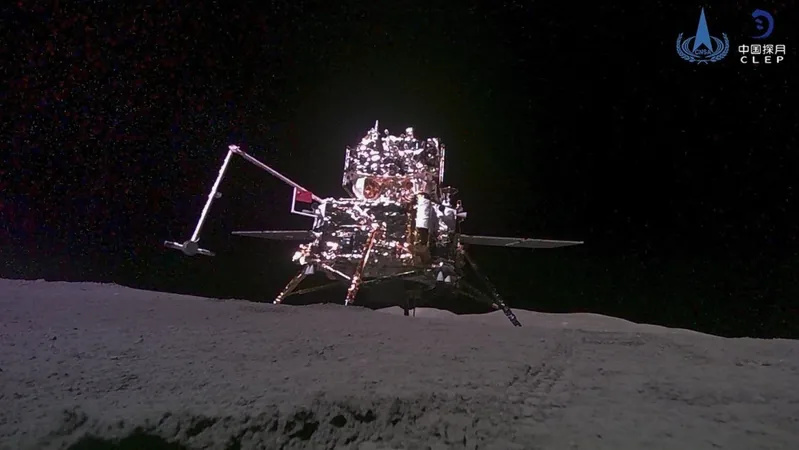
Europe Prepares for a Turbulent Shift Under Trump Presidency
2024-11-11
Author: Emily
European Union leaders have responded to Donald J. Trump's recent presidential election victory with cautious optimism, yet many experts warn of significant implications for security and trade on the continent. In a stark message, Anna Wieslander, the Atlantic Council's director for Northern Europe, noted, “Trump has been very clear: Europe must significantly increase its defense spending. Expect him to advocate for a pledge of three percent of GDP.”
This call for heightened expenditure comes in the wake of NATO's previous agreement to boost defense spending to two percent of GDP following Russia's annexation of Crimea nearly a decade ago. However, the timeline for reaching this target has extended into 2023 due to delays in response to growing Russian aggression, culminating in its full-scale invasion of Ukraine last year.
Wieslander emphasizes that while European nations recognize the gravity of their security needs, they have not backed this realization with adequate resources or political resolve. "The threat from Russia makes this shift urgent, especially if American support begins to wane,” she stated. A critical priority for Europe will be to lead efforts in aiding Ukraine against Russian advances, given Trump’s previous reluctance to approve additional military aid, which could leave European allies managing a significant financial burden.
The potential pressure from Trump to escalate European defense spending is viewed by some as a double-edged sword. Guy Verhofstadt, an influential MEP, voiced his concerns, highlighting that a "convicted felon and demagogue" leading the free world threatens liberal democracy. “Is Europe ready for this challenge? I hope so.”
President Emmanuel Macron of France, a prominent advocate for enhanced European strategic autonomy, stated, “I just spoke with Chancellor Olaf Scholz. We will work towards a more united, stronger, and more sovereign Europe in this new context.” Yet, within hours of his tweet, political turmoil struck Germany as Finance Minister Christian Lindner opted to leave the coalition government amidst defense spending disputes, prompting Scholz to call for a vote of confidence set for January—possibly leading to an early election.
Experts like Dimitar Bechev and Catherine Fieschi warn that the anticipated transition of power in the U.S. will not lead to immediate unity in Europe. Fieschi predicts a phase of turmoil, stating, “There will be chaos and uncertainty. However, this brutality could ultimately galvanize European cohesion more than in recent years.”
Indeed, Germany's Chancellor Scholz announced the notion of a Zeitenwende (epochal change) soon after the Russian invasion of Ukraine, intending to elevate Germany's defense spending by 100 billion euros ($106 billion). However, execution delays mean it may take until 2024 for Germany to reach the NATO target.
Adding to the complexity, Trump’s administration is unlikely to support the emergence of an autonomous European defense sector. Wieslander points out that previous U.S. administrations pressured Europe to procure American military equipment, hindering the development of independent European defense capabilities.
Recent research indicates that after 2022, a staggering 78 percent of procurement budgets in EU member states were allocated outside of the European Union, including a significant portion to the U.S. Despite the EU's push toward renewable energy independence, the bloc continues to incur substantial costs—over half a trillion dollars annually—importing fossil fuels, largely from the United States.
However, Europe possesses the foundational structure for autonomy, hosting two nuclear powers within its ranks—capable of acting independently should circumstances require. Professors such as Constantinos Filis argue that leaders in Europe have a pivotal opportunity to assert their autonomy if they navigate external pressures correctly.
Moreover, impending trade challenges loom on the horizon as Trump has threatened to impose significant tariffs—10 percent on all imports from Europe and 60 percent on Chinese imports. This raises the specter of a protracted trade war, with Fieschi warning that industries across Europe could face aggressive U.S. demands to relocate manufacturing within its borders.
The rising discourse around protecting European economic interests, even from right-wing factions, signals a potentially unifying thread among various political entities in Europe. As fears of economic domination by the U.S. escalate, European leaders may find common ground in advocating for an independent economic strategy that ensures Europe’s interests are safeguarded in the face of Trump’s aggressive policies.
In summary, Trump's presidency signifies a potentially seismic shift in Europe’s strategic and economic landscape, one that could demand a reevaluation of alliances and the push for greater autonomy. As leaders navigate this turbulent terrain, the stakes for European nations have never been higher. Will they rise to the challenge and emerge united, or will division prevail in the face of adversity? Only time will tell.









 Brasil (PT)
Brasil (PT)
 Canada (EN)
Canada (EN)
 Chile (ES)
Chile (ES)
 España (ES)
España (ES)
 France (FR)
France (FR)
 Hong Kong (EN)
Hong Kong (EN)
 Italia (IT)
Italia (IT)
 日本 (JA)
日本 (JA)
 Magyarország (HU)
Magyarország (HU)
 Norge (NO)
Norge (NO)
 Polska (PL)
Polska (PL)
 Schweiz (DE)
Schweiz (DE)
 Singapore (EN)
Singapore (EN)
 Sverige (SV)
Sverige (SV)
 Suomi (FI)
Suomi (FI)
 Türkiye (TR)
Türkiye (TR)